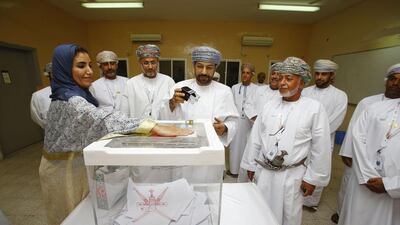ABU DHABI // Slightly more than half of Oman’s voters turned out to take part in shura council elections, the official news agency announced on Monday, significantly less than the previous polls in 2011.
Only one woman was elected to the council in the nationwide vote on Sunday that all Omanis over the age of 21 were allowed to participate in.
Nemah bint Jamiel bin Farhan Al Busaidiya was re-elected to represent Muscat’s Seeb district for another four years. She was also the only woman elected to the previous council. She will represent Seeb along with a male council member Hilal bin Hamad bin Mohammed Al Sarmi.
Districts with more than 30,000 residents have two representatives, while those with less have one.
The election saw 590 candidates, including 20 women, compete for the council’s 85 seats.
In 2011, there were 1,133 candidates, including 77 women, taking part in the election.
Of the 525,785 registered voters, 56.6 per cent cast their ballots on Sunday, according to the official Oman News Agency. The 2011 elections saw a 76 per cent turnout.
Ahmed Ali Al Mukhaini, an Omani political analyst in Muscat, said the turnout was “disappointing”.
“They indicate a decrease in interest among the populace,” he said.
Aisha Kharusi, a woman’s rights advocate based in Muscat, said the low female representation on the new council was also “disappointing”. The new council members would hopefully be “progressive in their decision-making”, she added.
“I believe the way forward for women candidates is to ensure a quota is put in place,” she said.
“The introduction of quotas should aim to be part of an overall approach to improve the distribution of political responsibility between both Omani men and women. After all, we are over 49 per cent of the population.”
Omani social commentator Younis Al Harrasi said that a number of young and well-educated candidates were elected.
“Generally, the election of many new young and well-qualified faces and re-election of good performing previous members, reflects a good degree of responsibility and awareness among many voters as well as their aspirations for a more effective role to be played by the council,” he said.
“This critical economic time requires competent members to effectively exercise the powers they have in the council and employ their expertise and knowledge to contribute to the development of the country.”
Similar to its Gulf Cooperation Council partners, Oman faces the challenges of lower government revenues after the fall in oil prices and large numbers of job-seeking youth. The last shura council attempted to make Omanisation and job creation a priority, but was criticised for its lack of success.
The council was founded in 1991 as an advisory body for Sultan Qaboos bin Said Al Said. Following Arab Spring-inspired unrest in 2011, Sultan Qaboos granted the council powers to revise and propose laws and call government ministers for questioning, along with electing its own chairman.
The protests were focused on corruption in government and business, along with demands for citizens to have an increased role in public life.
Sultan Qaboos maintains control over foreign affairs, domestic security and the military. He has maintained policies that have kept Oman out of the current Middle East unrest and seen the country lauded as a regional mediator.
jvela@thenational.ae

